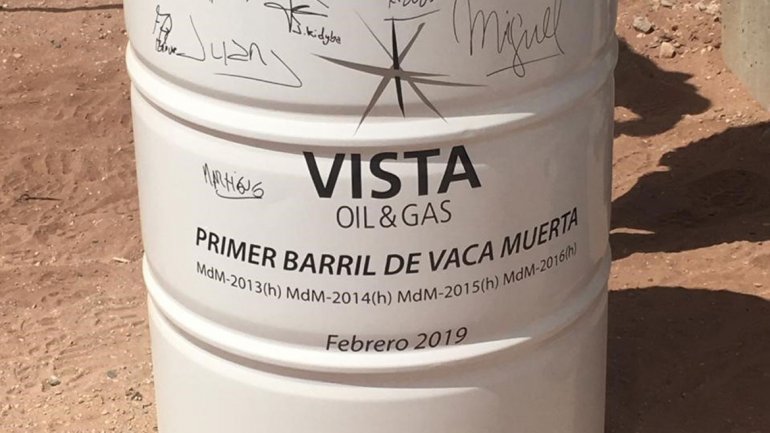Vista to invest $2.5 billion in Argentina until 2026
Vista, the second-largest producer of unconventional oil in Argentina, plans to put a total of 138 new "shale oil" wells into production between 2024 and 2026

The oil company Vista announced that it will invest $2.5 billion over the next three years to significantly increase its production levels in the colossal unconventional hydrocarbon formation of Vaca Muerta, in southwestern Argentina.
"Our goal is to continue increasing investment in order to boost greater activity, aiming for a production of 100,000 barrels of oil equivalent per day (boe/d) by 2026 and 150,000 by 2030," said Miguel Galuccio, founder, president, and CEO of Vista.
During an investor meeting, Galuccio presented details of the company's new strategic plan with objectives for 2026.
Vista, the second-largest producer of unconventional oil in Argentina, plans to put a total of 138 new "shale oil" wells into production between 2024 and 2026.
Galuccio emphasized that Vaca Muerta, the second-largest unconventional gas reserve and the fourth-largest unconventional oil reserve in the world, represented "almost half of the country's oil production and 70% of its crude oil exports" during the first half of this year.
"Its development has demonstrated its ability to generate significant additional exports, which could create a virtuous cycle of foreign currency revenue and investments that will drive the country's economic and social growth," said the Argentine entrepreneur.
Vista expects that the planned production growth will lead to greater operational efficiency, reducing the current extraction cost from $5.5 per boe to $4 per boe by 2026.
According to the company's new projections, its revenue would double, reaching $2.35 billion by 2026.
Regarding adjusted Earnings Before Interest, Taxes, Depreciation, and Amortization (EBITDA), Vista aims to double it, reaching $1.7 billion by 2026.
According to the updated projections, the company plans to generate $5 billion in operational cash flow between 2022 and 2026.
Vista, whose shares are listed on the New York and Mexico stock exchanges, also reaffirmed its goal to achieve carbon neutrality by 2026, reducing emissions intensity to 7 kilograms of carbon dioxide (CO2) equivalent per boe and offsetting the remaining emissions through carbon credits generated by "nature-based solutions" projects implemented by its subsidiary Aike.